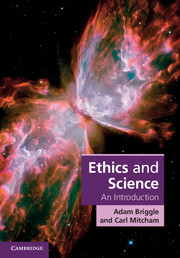Book contents
- Frontmatter
- Contents
- List of figures and tables
- Preface
- 1 Introduction and overview
- 2 Ethical concepts and theories
- 3 Science and its norms
- 4 Research ethics I
- 5 Research ethics II
- 6 Research ethics III
- 7 The science of ethics
- 8 Transition
- 9 Science and politics I
- 10 Science and politics II
- 11 Science and ideational culture
- 12 Science applied
- Epilogue Looking back, leaning forward
- Appendix Ethics codes
- Bibliography
- Index
- References
11 - Science and ideational culture
Published online by Cambridge University Press: 05 November 2012
- Frontmatter
- Contents
- List of figures and tables
- Preface
- 1 Introduction and overview
- 2 Ethical concepts and theories
- 3 Science and its norms
- 4 Research ethics I
- 5 Research ethics II
- 6 Research ethics III
- 7 The science of ethics
- 8 Transition
- 9 Science and politics I
- 10 Science and politics II
- 11 Science and ideational culture
- 12 Science applied
- Epilogue Looking back, leaning forward
- Appendix Ethics codes
- Bibliography
- Index
- References
Summary
As we saw in the previous two chapters, science is more than the practice of scientists, and ethics is an issue not only within the scientific community but also for the larger society within which modern science exists. Those chapters, however, were largely limited to politics. This chapter highlights interactions between science and culture. The term “ideational culture” denotes something much broader than politics and policies, namely, the attitudes, values, goals, practices, and beliefs that comprise a way of life and a way of ordering and making sense of experience. Science entails certain methods and practices for obtaining knowledge, as well as a set of theories or ideas. Yet these are not the only methods or theories to be found in human cultures, and science finds itself constantly interacting with the other methods and theories prominent in the contemporary world. The story of the Templeton Foundation illustrates the issues that arise when we adopt this wider perspective on science and its relationship to other spheres of society. This chapter then goes on to map four modes of interaction between science and culture. The final chapter considers the professional ethics of engineers, which is an important bridge between scientists and material culture.
Setting the stage: the Templeton Foundation
John Marks Templeton was born in 1912 in Winchester, Tennessee, not far from where John Scopes in 1925 was tried for teaching evolution in the public schools. A lifelong member of the Presbyterian Church, Templeton thus grew up in a culture in which the relation between science and religion took dramatic form as a conflict between biblical theology and the theory of evolution. He attended Yale University, earned a degree in economics (1934), and was awarded a Rhodes Scholarship to Oxford University. An extremely successful career in financial investment led to the creation of Templeton Growth Ltd. (1954).
- Type
- Chapter
- Information
- Ethics and ScienceAn Introduction, pp. 268 - 289Publisher: Cambridge University PressPrint publication year: 2012



